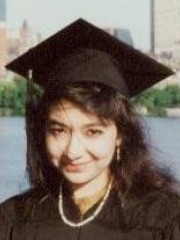
The Most Famous
MAFIOSOS from Pakistan
This page contains a list of the greatest Pakistani Mafiosos. The pantheon dataset contains 70 Mafiosos, 1 of which were born in Pakistan. This makes Pakistan the birth place of the 20th most number of Mafiosos behind Tunisia, and Kazakhstan.
Top 1
The following people are considered by Pantheon to be the most legendary Pakistani Mafiosos of all time. This list of famous Pakistani Mafiosos is sorted by HPI (Historical Popularity Index), a metric that aggregates information on a biography's online popularity.

1. Aafia Siddiqui (b. 1972)
With an HPI of 48.21, Aafia Siddiqui is the most famous Pakistani Mafioso. Her biography has been translated into 26 different languages on wikipedia.
Aafia Siddiqui (also spelled Afiya; Urdu: عافیہ صدیقی; born 2 March 1972) is a Pakistani neuroscientist and educator who gained international attention following her conviction in the United States and is currently serving an 86-year sentence for attempted murder and other felonies at the Federal Medical Center, Carswell, in Fort Worth, Texas. Siddiqui was born in Pakistan to a Sunni Muslim family. For a period from 1990, she studied in the United States and obtained from the Massachusetts Institute of Technology a BS in biology, and a Ph.D. in neuroscience from Brandeis University in 2001. She returned to Pakistan for a time following the 9/11 attacks and again in 2003 during the war in Afghanistan. Khalid Sheikh Mohammad named her a courier and financier for al-Qaeda, and she was placed on the Federal Bureau of Investigations's Seeking Information – Terrorism list; she was the first woman to have been featured on the list. Around this time, she and her three children were allegedly kidnapped in Pakistan. Five years later, she reappeared in Ghazni, Afghanistan, and was arrested by Afghan police and held for questioning by the FBI. While in custody, Siddiqui allegedly told the FBI she had gone into hiding but later disavowed her testimony and stated she had been abducted and imprisoned. Supporters believe she was held captive at Bagram Air Force Base as a ghost detainee, an allegation the US government denies. During her second day in custody, she shot visiting U.S. FBI and Army personnel with an M4 carbine an interrogator had placed on the floor by his feet. She was shot in the torso when a warrant officer returned fire. She was hospitalized, treated and then extradited to the US, where in September 2008 she was indicted on charges of assault and attempted murder of a US soldier in the police station in Ghazni, charges she denies. She was convicted on 3 February 2010 and later sentenced to 86 years in prison. Her case has been called a "flashpoint of Pakistani-American tensions", and "one of the most mysterious in a secret war dense with mysteries". In Pakistan, her arrest and conviction was seen by the public as an "attack on Islam and Muslims", and occasioned large protests throughout the country; while in the US, she was considered by some to be especially dangerous as "one of the few alleged Al Qaeda associates with the ability to move about the United States undetected, and the scientific expertise to carry out a sophisticated attack". She has been termed "Lady al-Qaeda" by a number of media organizations due to her alleged affiliation with Islamists. Islamic State have offered to trade her for prisoners on two occasions: once for James Foley and once for Kayla Mueller. Pakistani news media called the trial a "farce", while other Pakistanis labeled this reaction "knee-jerk Pakistani nationalism". Yusuf Raza Gilani, who was the Pakistani prime minister at that time, and opposition leader Nawaz Sharif promised to push for her release.
People
Pantheon has 1 people classified as Pakistani mafiosos born between 1972 and 1972. Of these 1, 1 (100.00%) of them are still alive today. The most famous living Pakistani mafiosos include Aafia Siddiqui.

